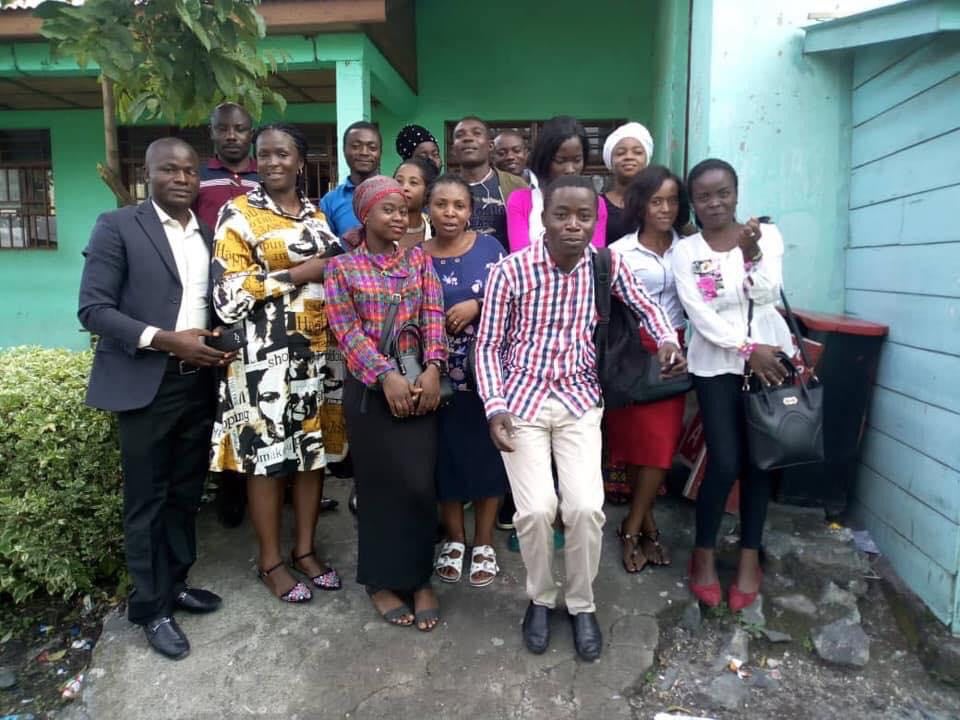
SELF-HELP AND RESILIENCE IN THE DEMOCRATIC REPUBLIC OF CONGO
I interviewed Bertin Kalimbiro from the Democratic Republic of Congo about his work in the Goma region to grow food safely and help people threatened
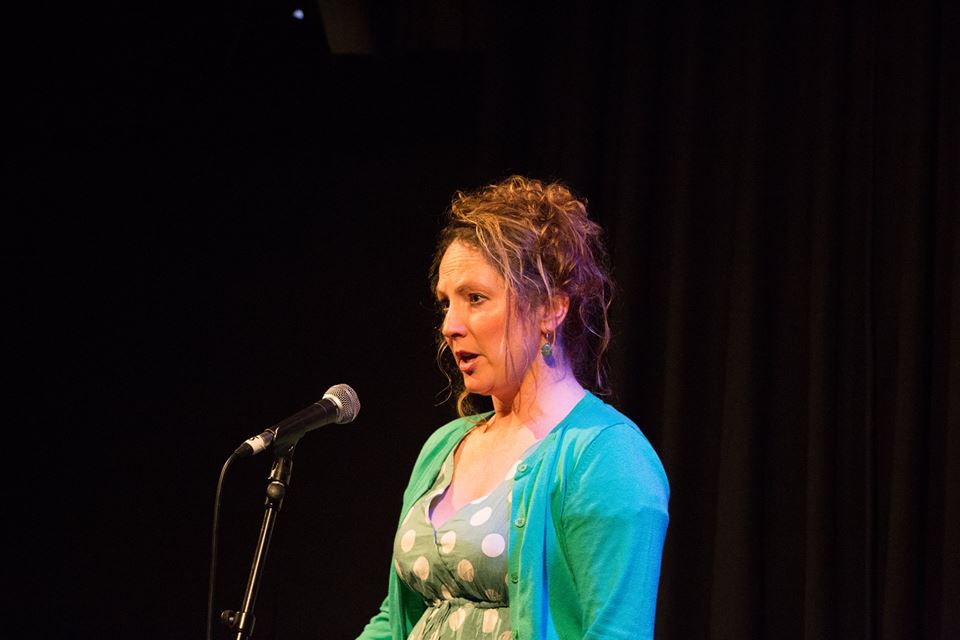
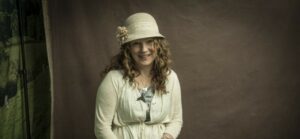
I interviewed multi-talented Welsh writer clare e. potter, who has won the John Tripp Award for Spoken Poetry and danced in Gary Clarke’s production of Coal – an on-stage experience clare spoke of as, ‘life-changing’.
clare has been active in the Literature Wales Dylan Cross-Art Form projects, which she described as: “Run by two paired artists who went into schools and pupil referral units to make work based on Dylan Thomas. The ensuing creations could be expressed through film, dance, a scene from a play, poems or sculpture.” She is also one of the Arts Council of Wales’ practitioners for the Lead Creative School initiative where, she says, “I worked with a sculptor and an actor/gamer with a group of ‘disengaged’ primary school children.”
In addition clare recently worked with the Forget-me-Not Chorus (a singing group for those living with dementia) and has appeared in two films: Jamie Adams’ Black Mountain Poets, and the BBC’s It’s My Shout scheme: Like/Unlike.
But what clare says she loves most of all are her word-based projects, including writing for theatre. About this, she says, “One project I did was through Literature Wales and the Welsh National Opera MAX office, and I wrote a musical for the Sherman’s Acting Out Youth Theatre. Much of my work has come either directly through Literature Wales projects or through referrals by them via the Writers on Tour scheme. For years, they have worked tirelessly to create these innovative projects. I’ll always be grateful to Literature Wales to have been involved in such diverse and meaningful work.”
Leslie: Can you tell us the story of your work as a writer in residence, please?
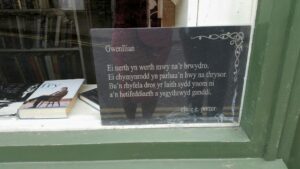
clare: I’m currently poet-in-residence for The Landmark Trust at Llwyn Celyn, a medieval hall house in the Black Mountains which is being renovated. I was sent the advertisement by Louise Richards in Literature Wales and I applied. What made me want to apply was that the remit was to create bilingual work in response to the house and surroundings during the two years of restoration. I had just begun to use Welsh in my work, thanks to the encouragement of Jon Gower and others and so I wanted to commit to something that meant I had to use Welsh more and in a creative way. I have been visiting about once a month and for each visit, I attempt to just ‘be’ – to absorb and to avoid the impulse to write poems. Instead, I record sounds and try to tap into my own inner landscape. I’ve done a lot of work on healing myself and I’m trying to see the connections between the house and my own emotional restoration. I’ve been collecting sounds and my aim is to then make soundscapes and as a result, to interact with those and produce poetry and sound. This is quite a new way of working and I’ve no idea if it will come together as I’m not very technically savvy; though I have made two audio poems before (which you can listen to here).
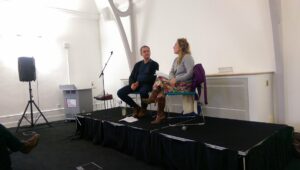
I find great peace at Llwyn Celyn and what has been a real surprise to me is how incredible the craftsmen are who work with I J Preece & Son. These are master craftsmen with so much knowledge of historical building practises. They work with care and precision and not only am I learning about restoration and what they are doing at the house, but also and unexpectedly, their insight and the way they work is teaching me much about how to craft poetry. For instance the carpenter, David Morgan talked to me at length about his tools (that he also made) and as he was drilling the window, I asked what he was doing. “I’ve got to find something solid,” he said, giving enough of a metaphor for a poem about seeking the solid in ground, in self. And Stuart the plasterer (who also made his own tools, authentic to the period), has come out with some amazing phrases that I’ve used. Stuart works, zen-line smoothing the plaster with its horsehair and sand, and this movement and interaction has taught me about layers and covering, uncovering. All of the craftsmen there have contributed to my creative interactions with the place. I love hearing how these men talk about their work. It all sounds like a rich metaphor to me and feels, though they won’t thank me for saying it, like emotional language. Love, care, practicality–that’s where there’s beauty, not just in the view of the mountains or the cwaaarrrk of the raven overhead.
Leslie: I’d like to ask you about five key experiences that I believe have made a deep impression on you…
clare: I learned more about being Welsh when I was living in America than I ever did being in Wales. I felt, if you like, the hiraeth when living in Mississippi and Louisiana. I had, for the first time, questions about my identity. Studying Afro-Caribbean Literature in a foreign country opened up all sorts of questions for me in terms of identity and belonging. I’d learned Welsh in an English language school with the incredible teachers Cerith Lewis and at sixth form Anne Bevan. I never used it, but when I lived in the States, I’d talk to myself in Welsh. I was trying to hold on to something that was particular to me. I think for me, being Welsh is rhythm. The way my aunties talk (albeit in English) their Welsh tones and dips and elongations are beautiful. It’s a hymn to me, and our hills and the two rivers I lived between, it’s the sound of landscape and speaking.
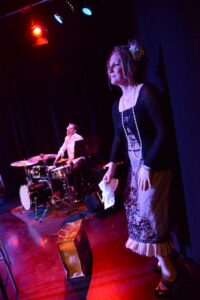
clare: This was a highly charged experience. I did my Masters’ Degree in this field at the University of Southern Mississippi where tensions between racial groups were high. This was alien and shocking to me. Something about those African-American and Afro-Caribbean women writers I explored, spoke to me, to my core. Injustice for race, for gender, hatred and oppression, resisting and emerging. It made me connect in terms of the Welsh experience and my own personal struggles. These were strong women making their voices heard. Using language as weapon, using language in a clandestine way, in a shape-shifting way, in an overt get-the-fuck-out–of-my-face kind of way. Loud and Clear. Unashamedly. I needed to hear that and I felt guided and empowered by Paule Marshall, Alice Walker, Mariama Ba, Buchi Emechata, Audre Lorde, bell hooks and my supervisor Professor Juliana Makuchi Nfah-Abbenyi in order to be able to recover and begin to assert my own voice. My supervisor also made me confront and examine my own white privilege. It was uncomfortable, important work. Of course, I’m still working through it and evolving.
clare: I’ve learned that I might have been alive in the 1930s singing on the stage in a jazz band, maybe in Harlem. Jazz allows me to toy with musicality, sexuality, frees me up and takes me deep.
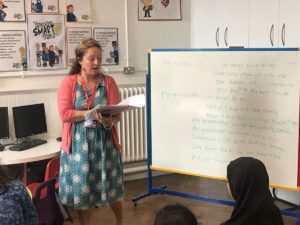
clare: I was afraid when I went to work with a group of women refugees at the Sanctuary in Newport as I was told there would be women who had experienced terrible atrocities and that many did not speak English well or at all. So, how would we create poetry? I had to work in a completely new way. I was very apprehensive. I brought my ideas of what would and wouldn’t happen. Assumptions and so on. But if the women present hadn’t been as generous, then I wouldn’t have felt so comfortable. On the first day, I couldn’t have said ‘Come on ladies, leave having your nails varnished, your crafts, your cups of tea, your English lessons, cooking, come and write some poems with me.’ Instead I took lots of fruit and veg, we had knives and cutting boards. We stood and sat in a circle, maybe 30 of us and I held up a potato, ‘Tatw’ in my language. Yours? Afal, moron and so on and then we peeled and cut and paired-pared our food and then we all arranged them on boards, plates, made art, conversed, loosened up and then we delighted in all the beautiful patterns and scenes we had made. And then we ate, together. The next time I went I was not a stranger to them and neither were they to me, so some were willing to come with me to a small room and we talked about our names and we wrote them and shared what they meant. We wrote our favourite words, listened to music and wrote and laughed and cried sad and cried joy. I feel grateful to these women for widening my understanding of the human spirit.
clare: That I actually do love to perform, to move, I love dynamism, connecting beyond words. I’m planning my next life and it will be back to the 40s as an actress. It’s very exciting. Look out for me.
Leslie: Where and how did your creativity first begin? How did it grow and develop? What are your thoughts about the conditions that nurture creativity (perhaps drawing on your own experience of teaching creative writing)?
clare: I believe we are made from a creative force and when we are born and as children (unless silenced or forbidden) we are all hugely creative. As we grow we lose bits here and there, as in The Neverending Story where Fantasia is gradually erased by the Nothing. My fantasies and expressing them was nurtured. My nan was a singer while peeling the spuds and danced around the house with me, told me to write poems, my uncle bought me a book of poetry when I was 5, my other uncle bought me my thesaurus when I was about 11, I had some teachers like Clifford James and Vic Mills who made poetry and song come to life, I went to chapel and saw creativity in Bible stories and singing hymns, I felt free to chant and dance, sing and write poems, to imagine. My grandmother told me about the spirits that visited and my parents told me stories, histories and read to me. I lived in a hotbed of working-class creativity. It was fertile. I go back in dreams and in writing, try to go to that pure place where there was no self-doubt or silencing, self-sabotage or impostor syndrome. When I do workshops with adults, I see in some that light of creativity has dulled but when we go back to that place of creative sap rising, it flows from them again and the light is bright. It’s a wonderful thing to experience and observe. I love doing creative workshops with little ones as they are busting with ideas. Beautiful little human beings with large creative energies. I learn, learn, learn.

ABOUT LESLIE TATE’S BOOKS:

I interviewed Bertin Kalimbiro from the Democratic Republic of Congo about his work in the Goma region to grow food safely and help people threatened

I interviewed computer expert and sustainability campaigner Dr Erlijn van Genuchten, who writes easy-to-understand books based on science full of practical suggestions for planet-friendly living.
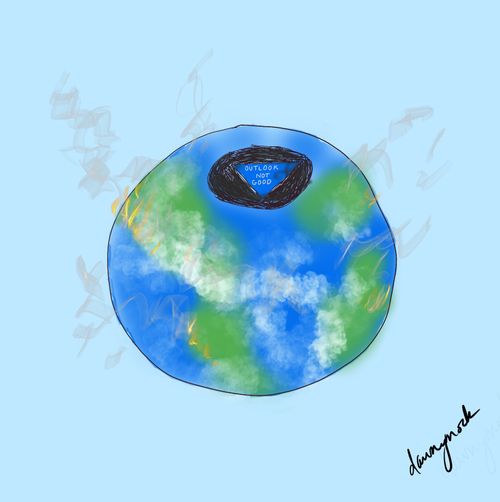
I interviewed Canadian cartoonist Dawn Mockler about how she works on cartoons that might be environmental or wordless but always witty – especially her famous
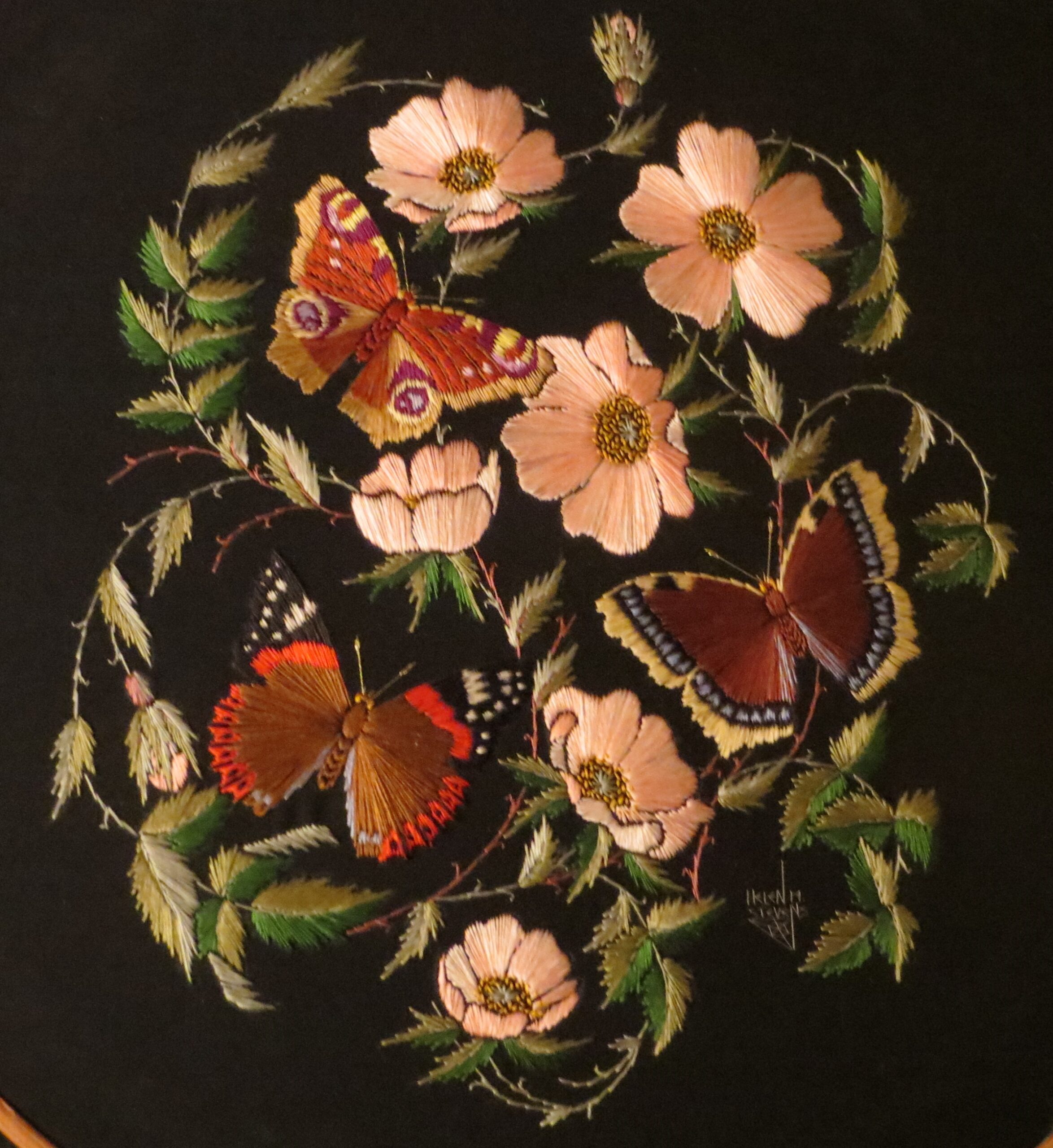
I inteviewed Helen M Stevens about how she has revived the art of embroidery, creating original contemporary patterns while studying and drawing on, “One of
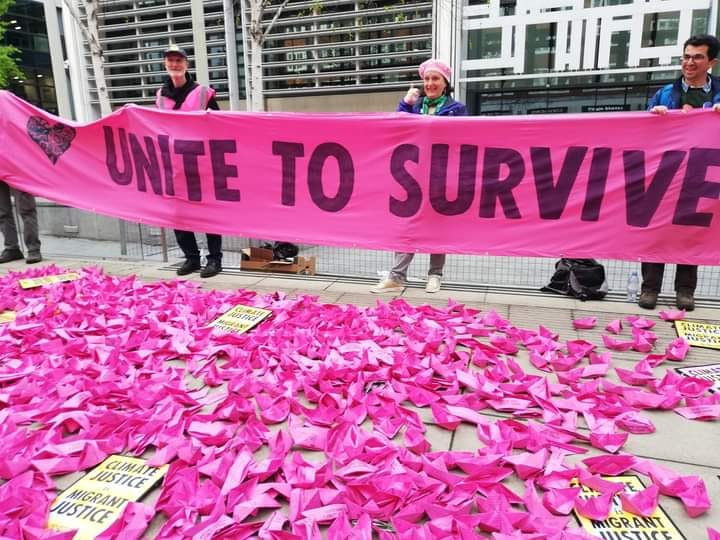
I interviewed Councillor Rachel Smith-Lyte about the origins of her passion for nature and her environmental activism. Rachel tells the story of her teaching (and
| Cookie | Duration | Description |
|---|---|---|
| cookielawinfo-checkbox-analytics | 11 months | This cookie is set by GDPR Cookie Consent plugin. The cookie is used to store the user consent for the cookies in the category "Analytics". |
| cookielawinfo-checkbox-functional | 11 months | The cookie is set by GDPR cookie consent to record the user consent for the cookies in the category "Functional". |
| cookielawinfo-checkbox-necessary | 11 months | This cookie is set by GDPR Cookie Consent plugin. The cookies is used to store the user consent for the cookies in the category "Necessary". |
| cookielawinfo-checkbox-others | 11 months | This cookie is set by GDPR Cookie Consent plugin. The cookie is used to store the user consent for the cookies in the category "Other. |
| cookielawinfo-checkbox-performance | 11 months | This cookie is set by GDPR Cookie Consent plugin. The cookie is used to store the user consent for the cookies in the category "Performance". |
| viewed_cookie_policy | 11 months | The cookie is set by the GDPR Cookie Consent plugin and is used to store whether or not user has consented to the use of cookies. It does not store any personal data. |
12 responses
What a great interview and oh how I’d love to chat identity with Clare Potter, in Welsh perhaps?
Wrth gwrs Elizabeth, cysyllta fi unrhyw bryd!
Thank you Leslie, for your care and attention with this interview–for giving me the opportunity to share some thoughts.
And thanks for being my interviewee, Clare! 🙂 🙂 🙂
Clare: you are amazing! I thoroughly enjoyed reading/hearing your words. You inspire and make us proud!
Ah, many thanks Dr. Abbenyi! You were hugely inspirational to me.
What a fascinating interview Clare. I was born in the Welsh valleys and remember my nanna singing in Welsh while she cooked. You have opened my heart again to this beautiful language. I’m half Romany too and have been re learning the language. I’ve also enjoyed reading about your work. Go well.
Thanks, Raine, for being such an appreciative soul! I’m hoping you can come back to this blog as a writer yourself and tell us about the film you were involved in…
You’re welcome Leslie. It has taken me a while to catch up with your interview’s but I so enjoyed this one. I’m looking forward to writing more about my Romany Project and of course seeing the film that I’m in, Stories from the Hop Yards in March. X
🙂 🙂 🙂
Ahh Raine, you don’t know what that means to me. Isn’t it wonderful when we read something and our own memories rush forward to connect. It’s why I love to read. Your own story sounds fascinating. I’d love to hear more about it. Have you written it down at all? Two incredible cultures at your service. Diolch o’r galon.
I’ve just looked at an interview with you Raine. An incredible poet. It thundered this morning as I read one of your poems! Not heard thunder in a while, so your work opening things for me too!
https://leslietate.com/2017/05/3349/
Thank you Clare, i’m so pleased that you liked my poetry, it is changing all the time and of course I am loving the Romani work right now. I’ve been collecting stories/memories from family members about hop picking, flower selling and so on. I’ve enjoyed re-imagining what it must have been like for my granny when she lived in a wagon, it feels very rich. One day i will delve more into my Welsh ancestry, until then I am happy to follow you, see where you go with your wonderful work. Diolch o’r galon.x